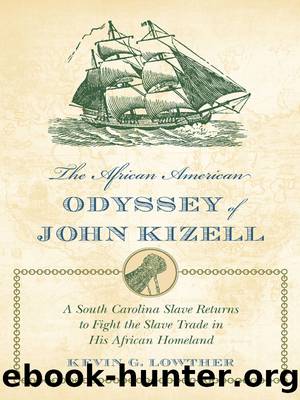The African American Odyssey of John Kizell by Kevin G. Lowther

Author:Kevin G. Lowther [Lowther, Kevin G.]
Language: eng
Format: epub
Tags: Nonfiction, History, Military, Biography & Memoir
ISBN: 9781611171334
Publisher: University of South Carolina Press
Published: 2012-06-05T04:00:00+00:00
Coastal Sierra Leone in the early 1800s. John Kizell established his village at Camplar (also spelled Campelar). Courtesy of Oxford University Press
The Methodists furiously refused to pay and again charged the company with breach of faith. On August 5 the tythingmen and hundredors reminded Macaulay that âwe have left Lands to come here in expectation to receive Lands in the same condition as we received them in Nova Scotia. But we findâ¦that the Company says the Land is theirs. Sir if we had been told that, we never could come here.â They then threatened to apply directly to the British government for redress or negotiate with the local Temne chiefs to obtain land to farm without encumbrance.70
Macaulay responded two weeks later with a long diatribe to a gathering of householders. He declared that they had known all along of the quit rent provision. âYou still return like the sow to flounder in the same dirty puddle,â he mocked. When Anderson asked to reply, Macaulay stalked out, leaving printed copies of his address to salt their wounded pride.71
Where Clarkson would have listened, reasoned, and sought common ground with the settlers, Macaulay was obtuse and unbending. He preferred dealing with his malleable children. He had no patience for adults such as Anderson and the recalcitrant Methodists, always jealous of their ârightsâ and freedom. A few of the Methodists had already determined to escape the company's hegemony and Macaulay's dictatorial management. Boston King, recently returned from religious training in England, persuaded some to remain in the colony. However, thirty families moved a few miles to the west, on Pirate's Bay, to establish their own settlement under the âpestilentâ Nathaniel Snowball.72
Following an angry confrontation in August with Anderson and his people, Macaulay sniffed insurrection. He warned the company's white servants and George's loyal Baptists to be ready to defend the governor's house. Macaulay almost seemed to relish challenges to his authority, even to his life. Warned several months later of a plot to murder him, he shrugged off the threat. He wrote smugly in his journal that the informer was âchagrined at my indifference.â73
No one attacked Macaulay's house or tried to kill him, but through his intransigence and his animus toward Anderson and others, Macaulay was seeding bloodshed to come after his departure. Far from plotting rebellion, Anderson's faction simply wanted to resolve once and for all the issue of their lands and the quit rent. This was their litmus test for freedom. Refusing to pay the quit rent, they surrendered their titles and began negotiating with the Temne for land to settle outside the colony.
They also appealed, as British subjects, for guidance from the king. When an English warship appeared in the harbor in January 1798, Anderson, Ishmael York, and Stephen Peters sent the captain, in his capacity as a royal official, a letter on behalf of the hundredors and tythingmen. The letter briefly rehearsed their grievances and asked whether they were indeed the king's subjects. For if they were, they wished to apply âto government to see ourselves righted in all the wrongs which are Due to us here.
Download
This site does not store any files on its server. We only index and link to content provided by other sites. Please contact the content providers to delete copyright contents if any and email us, we'll remove relevant links or contents immediately.
| Afghan & Iraq Wars | American Civil War |
| American Revolution | Vietnam War |
| World War I | World War II |
Waking Up in Heaven: A True Story of Brokenness, Heaven, and Life Again by McVea Crystal & Tresniowski Alex(37020)
Empire of the Sikhs by Patwant Singh(22187)
We're Going to Need More Wine by Gabrielle Union(18088)
Hans Sturm: A Soldier's Odyssey on the Eastern Front by Gordon Williamson(16820)
Leonardo da Vinci by Walter Isaacson(11926)
The Radium Girls by Kate Moore(10922)
Educated by Tara Westover(7084)
Tools of Titans by Timothy Ferriss(6969)
How to Be a Bawse: A Guide to Conquering Life by Lilly Singh(6704)
The Last Black Unicorn by Tiffany Haddish(5084)
Permanent Record by Edward Snowden(5009)
The Rise and Fall of Senator Joe McCarthy by James Cross Giblin(4853)
Promise Me, Dad by Joe Biden(4459)
The Wind in My Hair by Masih Alinejad(4428)
The Crown by Robert Lacey(4117)
A Higher Loyalty: Truth, Lies, and Leadership by James Comey(4042)
The Iron Duke by The Iron Duke(3653)
Joan of Arc by Mary Gordon(3271)
How to be Champion: My Autobiography by Sarah Millican(3196)
